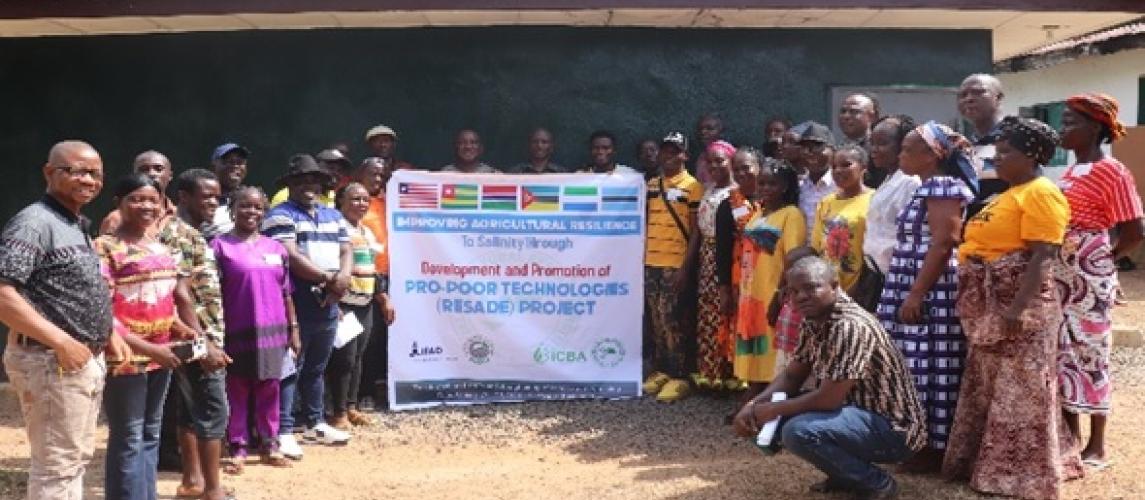
CARI/RESADE Project Collaborates With CDA To Transform Farmer-Based Organizations
BUCHANAN, Liberia—The CARI/RESADE Project is significantly impacting agricultural development in Buchanan. Highlights include the introduction of improved technologies to smallholder farmers’ organizations in Grand Bassa County and increasing productivity in salinity-affected lands. This initiative is crucial for enhancing the capacities of farmers and cooperatives.
The project focuses on building the capacity of farmers and extension workers in salinity-resilient and climate-smart agriculture, helping them adopt new cropping systems that are resilient to salinity and climate change. Additionally, the project raises stakeholders' awareness of salinity as a soil problem and provides education on addressing it. It supports national agricultural development policies and strategies by rehabilitating and increasing the productivity of salinity-affected lands.
To become duly registered cooperatives operating in the country, the project is working closely with the Cooperative Development Agency (CDA) to transform and elevate five smallholder farmers’ organizations into full-fledged cooperatives in Grand Bassa County. The Pre-Cooperative Formation Training Program (PCFTP) is the first of the ten steps required by the CDA. Established in 1936 and not functional until 1980 through an Executive Order, the CDA helps local farmers and other groups form cooperatives to enhance the production of locally grown rice, cocoa, and coffee.
In his opening address, Dr. James S. Dolo, Project National Coordinator, said that the training is part of a broader package to enhance FBOs’ capacity to increase agricultural productivity and incomes. The project aims to improve food security and reduce poverty among smallholder farmers, particularly women. Dr. Dolo, who led the four-man team collaborating with the CDA in training the FBO leadership, welcomed all participants and wished them a fruitful engagement.
Amuchin Zoryou, a proxy of Grand Bassa County District #3 lawmaker Matthew Joe, expressed excitement about transforming and elevating farmers' groups into full-fledged cooperatives, stressing: “Our offices remain open to the farmers.”
During the training, participants learned that a cooperative is an autonomous association of persons united voluntarily to meet common economic, social, and cultural needs. The exercise, which took place January 29-30, 2025, brought together the project team, facilitators from the CDA, and the leadership of five FBOs, including the United Women, Love and Unity, Garmamu, Brighter Future, Dehdoylajay, and the Bassa Agribusiness Cooperative Association.
The CDA, led by Harris B. Wennie, Director of Program and Project, facilitated a three-day training to transform and elevate farmer-based organizations into full-fledged cooperative societies in Grand Bassa County. The CDA highlighted an introductory overview of its roles and responsibilities in the project, emphasizing the historical perspective of cooperatives: national and international, with emphasis on sustainability, apex cooperative organizations, product value-added systems, income generation, and community development.
Other presentations covered the definitional framework of cooperatives, characteristics, benefits and challenges, and the basic steps to transform FBOs into cooperative societies. This also included break-up sessions and presentations on topics such as cooperative structures, the historical perspective of cooperative formation in Liberia, the benefits and challenges of cooperatives, cooperative characteristics, and the importance of the CDA’s statutory mandate.
Co-facilitated by Mr. J. McCarvens Mulbah, Director of Audit, participants gained insight into the cooperative framework, collective ownership rights, and governance through a democratic control system where group leaders are not the sole decision-makers. They learned about the major characteristics of a cooperative society: an association of people united and having common needs with equitable sharing of resources.
As a result of cooperatives, farmers learned that business activities would increase at both rural and national levels, domestic revenue would rise, and human resources and community agricultural development would be fostered.
Participants learned that the 10 major requirements (steps) necessary for the transformation of FBO groups are divided into two categories: cooperative status and full-fledged status. To become full-fledged cooperatives, a minimum of 15 persons, including women and youth, are required to declare shares, present a letter of intent with two copies of bylaws and a constitution along with minutes of the last meeting, and attach a list of the interim leadership elected through a democratic process by group members. The pre-cooperative status covers steps one to seven.
The lead facilitator explained that once the group names are prepared, specific activities, including good governance training, must be completed before FBOs are officially certified and issued permits. To become full-fledged, FBOs must have completed the following steps: conduct a democratic leadership structure under the direct supervision of the CDA, and establish and develop a business plan. Additionally, before a certificate is issued (within two to six months), FBOs must identify office space, erect signboards, and possess a bank account. Of the nine ways registered cooperatives source funding, only two are restricted to membership registration fees and shares.
Mr. Nyan T. Duarto, CDA Assistant Registrar for Grand Bassa County, encouraged the leadership of smallholder farmers to work together and follow all the steps required to become full-fledged cooperatives operating in the county. “Count on me for any support you may need from the CDA.”
